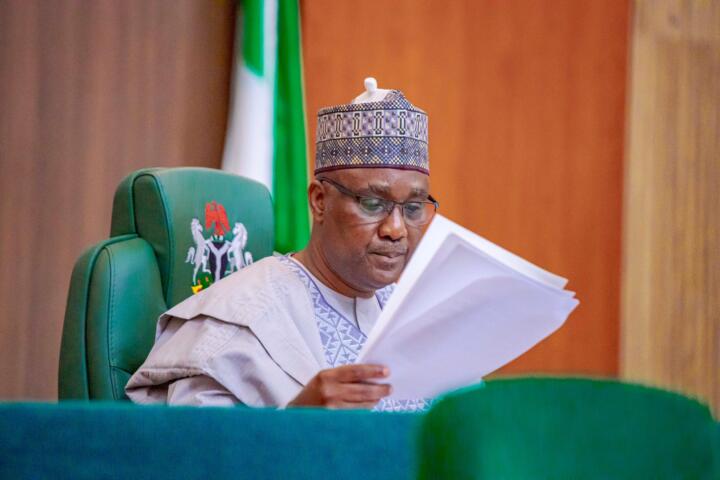In a significant move towards promoting gender equality and inclusivity, Nigeria’s Speaker of the House of Representatives, Tajudeen Abbas, has called for a constitutional amendment that would grant equal citizenship rights to foreigners married to Nigerian women.
This proposal reflects a growing recognition of the need to address outdated legal frameworks that have historically favored men in matters of citizenship and marital rights. The push for this amendment is part of a broader effort to ensure that all Nigerians, regardless of their gender, have equal rights in family and citizenship matters.

Context of the Proposed Amendment
Under current Nigerian law, foreign spouses married to Nigerian men automatically acquire Nigerian citizenship, while the reverse is not true for women. This legal disparity has raised concerns about gender inequality and the implications it has for families and individuals in intercultural marriages. The Speaker’s proposal seeks to rectify this imbalance, acknowledging that marriage should not dictate one’s citizenship status based on gender.
The call for constitutional reform comes amidst ongoing discussions about gender rights in Nigeria, where issues of inequality and discrimination continue to affect women in various aspects of life, including legal rights, economic opportunities, and social status. The amendment represents an essential step towards fostering an inclusive society that recognizes the contributions of all its members, regardless of their nationality or gender.
Importance of Equal Citizenship Rights
Granting equal citizenship rights to foreigners married to Nigerian women is a significant milestone for gender equality in Nigeria. The proposed amendment would not only enhance the rights of women but also strengthen family unity. Many Nigerian women who marry foreign nationals often face challenges when their spouses seek to live and work in Nigeria. By allowing foreign spouses to acquire citizenship, the amendment would facilitate smoother integration into Nigerian society, promote family cohesion, and ensure that families can thrive together without the fear of immigration challenges.
Moreover, this change would align Nigeria’s citizenship laws with global trends that prioritize inclusivity and gender equality. Many countries have adopted more progressive policies regarding citizenship rights for foreign spouses, recognizing the importance of family ties in building cohesive societies. By following suit, Nigeria can enhance its international reputation and demonstrate its commitment to upholding fundamental human rights.
**Challenges to Implementation**
Despite the potential benefits, the proposed amendment may face challenges in gaining widespread support. Some lawmakers and segments of society may resist changes to traditional notions of citizenship and marriage, fearing that granting equal rights to foreign spouses could dilute national identity or undermine cultural values.
Additionally, there may be concerns about the administrative implications of implementing such a change. Policymakers will need to consider the legal framework surrounding citizenship applications and ensure that the process is transparent and efficient. This will require collaboration between various government agencies to create a seamless pathway for foreigners seeking Nigerian citizenship through marriage.
**Public Support and Advocacy**
As the Speaker champions this cause, public support will be crucial for the success of the proposed amendment. Advocacy groups, women’s rights organizations, and civil society play a vital role in raising awareness about the importance of equal citizenship rights. By mobilizing public opinion and engaging in constructive dialogue, these groups can help to shift perceptions and garner broader backing for the amendment.
Social media campaigns, community outreach, and public forums can serve as platforms to educate citizens about the benefits of the proposed changes and the need for gender equality in all aspects of life. Engaging influential voices within the community, including religious leaders and cultural icons, can also contribute to changing mindsets and fostering acceptance of the amendment.
Conclusion
The proposal by Nigeria’s Speaker of the House of Representatives to amend the constitution to grant equal citizenship rights to foreigners married to Nigerian women represents a crucial step towards achieving gender equality and inclusivity in the country. By addressing the existing legal disparities that favor men, this initiative not only empowers women but also strengthens families and communities.
As Nigeria navigates this important conversation about citizenship and gender rights, the collaboration between lawmakers, advocacy groups, and the public will be essential in driving meaningful change. Ultimately, the successful implementation of this amendment could pave the way for a more equitable and just society, where all individuals, regardless of their nationality or gender, are afforded the same rights and opportunities. As discussions continue, the commitment to fostering an inclusive Nigeria remains paramount for building a future that values and uplifts every citizen.
Support InfoStride News' Credible Journalism: Only credible journalism can guarantee a fair, accountable and transparent society, including democracy and government. It involves a lot of efforts and money. We need your support. Click here to Donate
